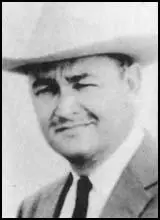Rolando Masferrer

Rolando Masferrer was born in Cuba. He became a successful newspaper publisher. Masferrer was a strong supporter of Fulgencio Batista and helped organize a private army, Los Tigres, to deal with the dictator's critics. When Fidel Castro gained power it is claimed that Masferrer fled to the United States with $10 million.
Masferrer settled in Miami where he established an anti-Castro organization called the 30th of November. He also had links with Alpha 66. Masferrer attempted to organize the assassination of Castro. He also remained in contact with Santo Trafficante and Jimmy Hoffa who provided funds for his activities. According to William C. Bishop: "Hoffa gave Masferrer $50,000... expense money... to partially set up the assassination team."
Rolando Masferrer was killed in Miami, Florida, on 31st October, 1975, as a result of a dynamite bomb being placed in his car. FBI Agents Robert Scherrer and Carter Cornick believed that Guillermo Novo played a key role in the murder of Masferrer. According to Saul Landau: "Masferrer, a master of anti-Castro slogans, supported violence against the Cuban revolution. But his efforts had brought no results and the more ambitious exiled Cubans began to think of his rhetoric and his purported militant actions as a front for his “business” activities. Masferrer stood as an obstacle to Mas Canosa’s plans to forge an effective and unified counter revolution".
Primary Sources
(1) Richard Case Nagell, interviewed by Dick Russell (1977)
I conducted inquiries relative to 'dissident' members of several Cuban refugee groups based in the United States; I checked out an alleged connection between a Miami resident named Eladio Del Valle and New Orleans CIA informant Sergio Arcacha-Smith; I investigated an associate of the now deceased right-wing extremist David W. Ferrie of New Orleans... I conducted a surveillance on a man, said to have been an ex-CIA employee, observed talking to (exile) leader Manuel Artime and former Cuban senator/racketeer Rolando Masferrer.
(2) Dick Russell,The Man Who Knew Too Much (1992)
Nicknamed "The Tiger" after his ruthless private army of the Batista era, Masferrer was an ex-Cuban senator and newspaper publisher who reportedly fled the island with as much as $10 million. "A guy who could slit your throat and smile while doing it," as U.S. Senate aide Al Tarabocchia put it.
In Miami, Masferrer was an FBI informant who maintained connections to the Trafficante underworld. His "30th of November" exile organization kept up efforts to eliminate Castro all through 1963 and beyond. Cuba seems to have responded in kind; Castro was known to have a substantial bounty out on Masferrer. As we saw in Chapter Ten, before leaving Mexico City Nagell obtained a weapon, with Masferrer as the original target.
And who was the unidentified man - "said to have been an ex-CIA employee" - whom Nagell observed talking with Artime and Masferrer that January 1963 day in Miami? Based on other material supplied me by Nagell, I believe it was a Cuban exile who used the "war name" of "Angel" (pronounced On-hel). He, along with a partner, would later come into direct contact with Lee Harvey Oswald.
(3) William C. Bishop, interviewed by Dick Russell (1990)
I was to obtain additional funding, I'll say this and no more, from the (crime) Syndicate out of New Orleans, for Alpha 66. At that point in time, Rolando Masferrer was the key bagman, for lack of a better term, for Alpha 66. Primarily the funding came through the Syndicate, because of Masferrer's connections with those people back in Cuba. He had ties with Santos Trafficante, Jr., and other criminal elements. Organized crime, pure and simple. He also had different ties with Jimmy Hoffa. As far back as 1962,1 think. But Rolando, from time to time when it came to large sums of money, had sticky fingers. I think that's why he was killed, eventually. Either that, or the Kennedy assassination. Because he knew about it.
(4) Saul Landau, Anti-Terrorism Update (20th September, 2003)
In the 1960s, Guillermo and his brother had linked their political fortunes with an overtly fascist anti-Castro group called the Cuban Nationalist Movement. According to FBI Agents Carter Cornick and Scherrer, whose police work helped crack the Letelier Moffitt assassination case and point the finger at the highest levels of the Pinochet government, Novo pursued his violent anti-Castro activities throughout the 1960s and early 1970s. Scherrer claimed that “he tried to finance through drug dealing. But we could never make a charge stick.” Guillermo’s reputation as a tough guy included an incident where, to show his courage and machismo, drove his car into a brick wall at high speed.
In 1975 Guillermo and Ignacio had already forged links with General Pinochet’s secret police. Indeed, FBI Agents Scherrer and Carter Cornick, who was the point man on the Letelier case, were convinced that the Novo brothers had played key roles in the assassination of anti-Castro exile Rolando Masferrer whose death directly benefited Jorge Mas Canosa, the man who went on to lead the Cuban American National Foundation, the most powerful anti-Castro pressure group in the nation.
Masferrer, a Senator in Batista’s Cuba, won his notoriety for leading a small army known as "Masferrer's Tigers." Prior to Castro’s assumption of power in January 1959, these thugs attacked violently factions that opposed the Batista regime. In exile in Miami, he bought and published a Spanish language newspaper named Libertad. But he also continued his better-paying occupation: the extortion of small and easily intimidated business people in south Florida.
Masferrer, a master of anti-Castro slogans, supported violence against the Cuban revolution. But his efforts had brought no results and the more ambitious exiled Cubans began to think of his rhetoric and his purported militant actions as a front for his “business” activities. Masferrer stood as an obstacle to Mas Canosa’s plans to forge an effective and unified counter revolution, which would include meaningful violence and political pressure.
